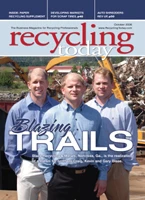Amendments to the U.S. Federal Rules of Civil Procedure will go into effect Dec. 1, barring Congressional intervention, further affecting the way companies manage their data.
The new regulations will pertain to the discovery of data in electronic media, or e-discovery. Attorneys will be expected to be knowledgeable about their clients’ electronically stored information (ESI), and courts will require technologically detailed information for discovery plans involving the collection and preservation of such information.
According to a white paper titled "The Federal Rules of Civil Procedure (FRCP) Changes—The Top Ten Things to Know About Them and Electronic Discovery," produced by Joel Wuesthoff, director of industry and regulatory affairs for Ibis Consulting, "The Rules have caught up to the case law with the addition of the words ‘electronically stored information’ to Rule 34," which currently specifies production of "documents and things."
The Committee Notes for Rule 34(a) state, "it has become increasingly difficult to say that all forms of electronically stored information, many dynamic in nature, fit within the traditional concept of a ‘document’. Electronically stored information may exist in dynamic databases and other forms far different from fixed expression on paper." Therefore, "Rule 34(a) is amended to confirm that discovery of electronically stored information stands on equal footing with discovery of paper documents."
At the same time, a Rule 34 request for production of "documents" should be understood to encompass, and the response should include, electronically stored information unless there has been a designation between electronically stored information and ‘documents,’ according to the notes.
Rule 34(a) will not be the only civil procedure affected by the pending amendments. "Expect early and informed judicial participation," Wuesthoff writes in his white paper. "The amendment to Rule 16(b) is designed, as indicated in the notes, to serve as an ‘alert mechanism’ for the court that electronically stored information may be in play. The amended Rule 16 says that a scheduling order may include ‘provisions for disclosure or discovery of electronically stored information.’"
Additionally, Rule 26(a)(1)(B) "mandates the disclosure of ESI that a party may use to support its claims or defenses. This disclosure, by way of copying or describing by category or location, must be made without waiting for a discovery request," Wuesthoff writes.
More information on these procedural changes is detailed in Wuesthoff’s white paper, available online at www.ibisconsulting.com/resources/white_papers.
Get curated news on YOUR industry.
Enter your email to receive our newsletters.

Explore the October 2006 Issue
Check out more from this issue and find your next story to read.
Latest from Recycling Today
- Recycled steel price crosses $500 per ton threshold
- Smithers report looks at PCR plastic’s near-term prospects
- Plastics association quantifies US-EU trade dispute impacts
- Nucor expects slimmer profits in early 2025
- CP Group announces new senior vice president
- APR publishes Design Guide in French
- AmSty recorded first sales of PolyRenew Styrene in 2024
- PRE says EU’s plastic recycling industry at a breaking point





